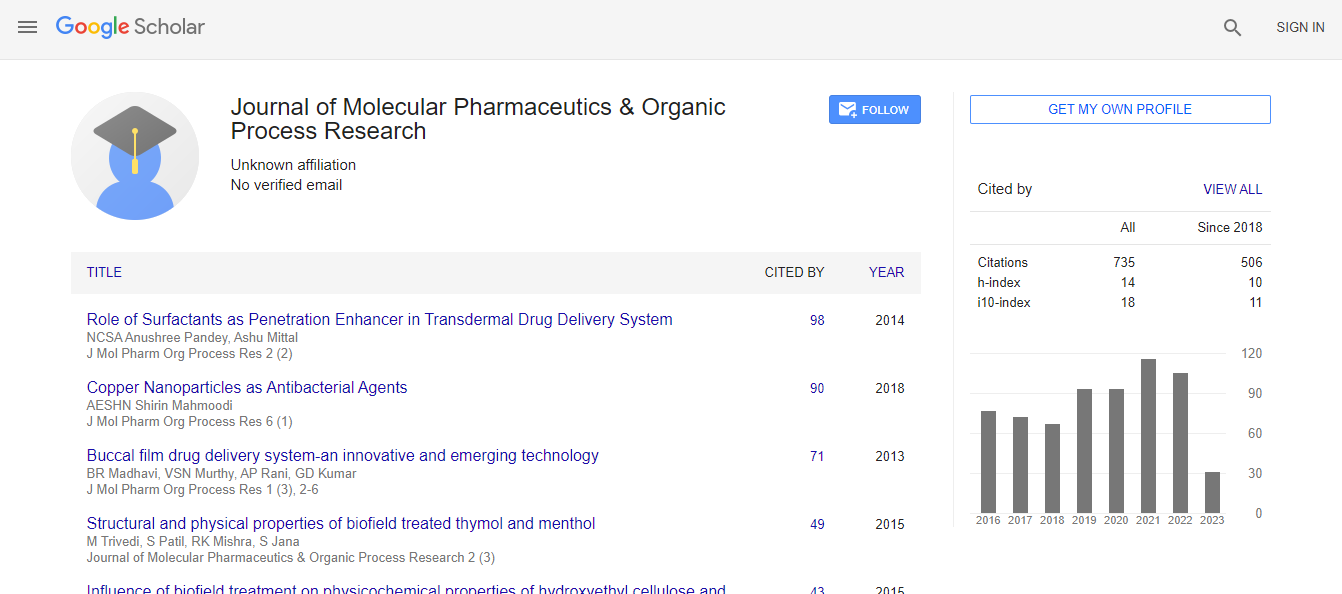Our Group organises 3000+ Global Conferenceseries Events every year across USA, Europe & Asia with support from 1000 more scientific Societies and Publishes 700+ Open Access Journals which contains over 50000 eminent personalities, reputed scientists as editorial board members.
Open Access Journals gaining more Readers and Citations
700 Journals and 15,000,000 Readers Each Journal is getting 25,000+ Readers
Google Scholar citation report
Citations : 1057
Journal of Molecular Pharmaceutics & Organic Process Research peer review process verified at publons
Indexed In
- CAS Source Index (CASSI)
- Index Copernicus
- Google Scholar
- Sherpa Romeo
- Open J Gate
- Academic Keys
- RefSeek
- Hamdard University
- EBSCO A-Z
- OCLC- WorldCat
- Publons
- Euro Pub
- ICMJE
Useful Links
Recommended Journals
Share This Page
Microphysiological systems: Tissue chips for drug screening program for safety, efficacy and precision medicine
2nd International Conference on Pharmaceutical Formulations and API
Danilo A. Tagle
National Center for Advancing Translational Sciences, USA
ScientificTracks Abstracts: J Mol Parm Org Process Res
Abstract
Approximately 90% of drugs fail in human clinical trials due to adverse reactions and/or due to lack of efficacy. These failures can be attributed to poor predictability of human response from animal studies and 2D in vitro models being used preclinical drug development. To address these challenges, the Tissue Chips or Microphysiological Systems for Drug Screening program supports the development of alternative approaches for more predictive readouts of toxicity and efficacy of candidate drugs. Tissue chips are bioengineered 3D microfluidic chips with human-derived cells and tissues that mimic the cytoarchitecture and functional units of human organs and systems. Initially tissue chips were used for in vitro models for risk assessment in safety pharmacology. As an example, human liver on chips have been shown to have 87% sensitivity and 100% specificity in anticipating the drug toxicities of 22 compounds with known hepatotoxic (was advanced to human use based on previous preclinical data but was withdrawn due to toxicities which collectively are responsible for more than 200 patient deaths and 10 liver transplants) outperforming liver spheroids which showed a sensitivity of only 47%. In addition to toxicity studies in drug development, tissue chips are also being used to model various human diseases and conditions when animal models do not mirror the pathology or are unavailable. Tissue chips was used to model chronic inflammatory demyelinating polyneuropathy and multifocal motor neuropathy, a pair of rare, devastating neuromuscular diseases, which led to the identification of a repurposed drug and approval by the FDA for phase 2 clinical trial. A more recent application of tissue chips is on its use as ├?┬ó├?┬?├?┬?clinical trials on chips├?┬ó├?┬?├?┬Ł to inform clinical trial design and implementation. This new initiative will help establish patient recruitment criteria, stratify patients to determine who the best responders to specific therapies are, include population diversity and identify clinically relevant biomarkers. Presentation will also include an overview over the decade of support from NIH, partnerships with various stakeholders including the FDA and pharmaceutical industry.Biography
Danilo Tagle is currently Director, Office of Special Initiatives at the National Center for Advancing Translational Sciences (NCATS) of the National Institutes of Health (NIH). He obtained his PhD in molecular biology and genetics from Wayne State University School of Medicine in 1990. He was an NIH National Research Service Award postdoctoral fellow in human genetics at the University of Michigan. He has authored many scientific publications and has garnered numerous awards, including more recently the Roscoe O. Brady Award for Innovation and Accomplishment; the Henry J. Heimlich Award for Innovative Medicine and the HHS Secretary's Award for Distinguished Service: Rapid Acceleration of Diagnostics (RADx) Initiative.

 Spanish
Spanish  Chinese
Chinese  Russian
Russian  German
German  French
French  Japanese
Japanese  Portuguese
Portuguese  Hindi
Hindi 
